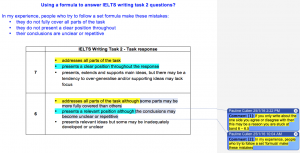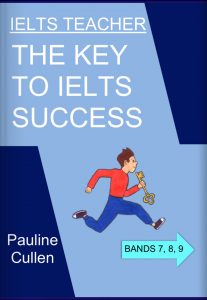On my Facebook page, many people ask questions like this about writing task 2:
‘Could you please tell me, for agree/disagree questions, what is the best approach to achieve a higher score? In my previous IELTS exam, I completely disagreed with the question and mentioned all points related to that whereas my friend wrote about both sides (advantages and disadvantages) and he scored 7.5. Can that be the reason for my low score?’
I receive these questions whenever I talk about discussing both sides of the question in your answer. The people who question this view tend to be people who have studied a set formula to use in each essay question. One such ‘formula’ incorrectly states that you ‘must only discuss the side you agree with.’ In my experience, people who try to follow a set formula for different question ‘types‘:
- do not fully cover all parts of the task
- do not present a clear position throughout
- produce conclusions that are unclear or repetitive
If you look at this extract from the IELTS band descriptors, you can see that these are problems for Band 6 candidates, but not Band 7 candidates:

So, using a set formula could be a key reason why you are stuck at Band 6 or 6.5.
Don’t think about using a specific formula in writing task 2. Instead, think about discussing the issue you are given and answering the question.
Read my free book to find out more:
Use my vocabulary apps to help build your active vocabulary for IELTS writing and speaking:






The other Q is : the usual paragraphing system is :
P1= introduction – P2 = one POV- P3 = the other POV
P4= Conclusion
: Sometimes there is a temptation to discuss both POV in one paragraph. For example:
“Though animal rights activists propose using computational simulation in medication experiments, scientists argue that the currently available computer software is not advanced enough to replace lab animals. ”
———-
Here I found this is more NATURAL AND SEAMLESS in the context of building a discussion. This is the way my mind works simply!!!
What is your opinion in both problems???
Hi Mohammed, as most people contact me through my Facebook page at the moment, I missed these questions. I hope I managed to answer them for you on Facebook 🙂
Hi Mohammed, my first comment is that this is NOT an IELTS question! If you can find an authentic IELTS question that you have the same problem with, that would help. Your plan for the question you have given here would work because the question itself does the same thing – it covers 2 view points in one sentence – IELTS won’t do this. The topic and vocabulary used here is also far too specialised. If you practice using questions like this, you won’t develop the skills you must show in the test.
That’s all well and good for pencil pushers in Cambridge but down here on the ground teachers are working with students who have no idea how to write an essay. I routinely get essays that have 15 or 20 different arguments. I recently got an essay where the first paragraph was an introduction, the second paragraph was an introduction, and the third paragraph was another introduction.
This assumes students come to you and already have some idea how to “organise an idea into logical paragraphs” so they can intuit the best way to answer any essay they are given in IELTS. This is okay for journalism students and lifelong avid readers, everyone else is lost.
An upper-intermediate or advanced student comes to me and tells me they need a 6.5 or 7 in three months. They have never written what we would recognise as an essay before in their entire lives. And you are telling me not to teach them formula? What else can I do in three months when I only see them an hour and a half a day and we also have to work on all the other exam skills, and the sheer skill of doing their best on the day despite the pressure of time constraints and the fear of losing the equivalent of a month’s rent if they fail.
Are there practical alternatives to formula?
I hope the tone of this message doesn’t seem unfriendly. It is hard to convey tone online.
Hi Olivia, I’m not really sure who you are referring to as pencil pushers at Cambridge – I can assure you that I work for free giving as much advice as I can. I was a teacher for many years and I mostly taught at the level you describe. My free book aims to show teachers how to approach teaching at this level as well as showing the students themselves, so I hope you will find it useful. The formula are exactly what will keep your students stuck at this same band, so it is seems a waste of effort to continue to teach these if that is what you are doing. It would be much better to concentrate on helping your students to develop their ideas during the time that you do have them -I have always found that a large part of the teacher’s job at that level is to guide and train in ways of learning. I do explain this in my book so I hope you will find it helpful. But the point remains that teaching ‘formula’ will not help candidates who want to achieve a band higher than band 6 or 6.5.
I mostly use formula which I learned from the Official Cambridge Course. 🙁 Your website and the book Grammar For IELTS have already been very helpful and I will do some intensive reading of your ebook too. ( I am working on convincing my school to buy the Official Guide to IELTS but I am always the squeeky wheel and I think they are fed up with giving me grease 😉 )
Maybe “formula” is too strong a word?
What I mean is things like this (when a student has decided to write an opinion essay)
Introduction: Rewrite the question in your own words and then say what the purpose of your essay is and your opinion
Paragraph 1: say one reason why you are right and explain it, making the topic of this paragraph clear in the first sentence
Paragraph: Say one more reason why you are right and explain it, making the topic of the paragraph clear in the first sentence
Conclusion: Give a summary including your opinion, try not to repeat vocabulary from earlier where possible
Otherwise I get essays that have no paragraphs. Essays that have no introductions. Essays that have lots of ideas and examples and explanations in their introductions, essays that contain 14 (I counted) undeveloped ideas (instead of two or three developed ones), essays that include long lists of memorized facts about the British Arts and Crafts movement… that sort of thing
Writing an essay is an incredibly intimidating and completely foreign thing for a lot of my students and .. let’s call them guidelines instead of formula… help them so much. The usual exclamation is “I have no idea how to do this in my own language, let alone English”
HI Olivia, can you explain what you mean by ‘THe Official Cambridge Course’? I don’t know what that is. I am writing the writing chapter of my book now, and I am sure you will find it useful. There is no such thing as an ‘Opinion’ essay – can you send me an example of a question that would suit your plan? I am not sure it would fit an authentic writing task. It is really important for them to write in paragraphs, so that is important to teach. I does sound as though your students don’t have the language needed – in which case it is better to work at the sentence and paragraph level only for a while – I would advise you to not always write whole essays, but to spend some time discussing ideas in groups then each group writing either body paragraph one or body paragraph two, then as a class add the introduction and conclusion. Rather than formula it would be better to write a guided essay like this, so they see what needs to be done and you can work on language problems as a group / class. Hope this helps. Where is your school? I am always happy to come and give talks.
It is called “How to teach IELTS” and it is offered by Cambridge.
Here is an example of an essay that would suit the plan:
“Some people think that governments need to do more to protect the environment. Do you agree?”
It comes from “How to Teach IELTS”.
The course said that the suggested structure for that particular essay was thus:
Introduction + statement of opinion
Paragraphs 2 and 3: justification for opinion
Conclusion
Another one from the same screen was:
“Global environmental issues are the responsibility of rich nations not of poorer nations. Do you agree with this opinion?”
The other advice comes from other parts of the course, but I haven’t got those parts saved so I cannot quote directly as I did with the things above. It is possible I am not doing it justice.
My school is in Ireland. I would looooooooooooooooove for you to come, you can’t imagine! But our CPD budget is non existent, unfortunately. The videos of your talks on youtube are also great.
Whereabouts in Ireland? I have never managed to get paid to give a talk or webinar yet (a lot of people assume we are paid but we only exist on royalties and very small test writing fees) I would be happy to come and give a talk some time if you think your school could muster up enough attendees? Or if you know a good venue? Publishers are no longer offering royalties so I am having to self-publish now and try to boost existing book sales by any means possible (hence my free book). I am also having to constantly battle illegal downloads of my books (book sales halved for 2 of my books last year and they sell in smaller numbers than you would imagine!) I don’t know this course your talking about – was it a future learn one? That essay is not a great example of an IELTS one, I don’t think. Was it for GT? We would never end with ‘Do you agree?’
I am very sorry to hear that. Coursebook design is one of those pipedreams on the horizon for a lot of long term ESL teachers, I thought that was where you’d earn the “big bucks”.
The essay and structure advice were from the Cambridge English teacher website (now defunct) and I skimmed over the modules on General IELTS so it must have been for Academic IELTS. Well, there is something! You could offer to review their course for them and replace anything inaccurate.
What I would love would be a course that would train me how to mark IELTS properly, as if I were an examiner. I think it is the only way to ever be able to tell for myself good advice from bad advice and good materials from bad materials. I have contacted my local exam centres but they are not looking for examiners. I do wish IELTS would allow al examiners to tell people they were examiners, it would make it easier to know whose advice to follow.
“With an increasingly overweight population some people think universities should make sport a compulsory module on all degree courses.
To what extent do you agree?”
– Is this an example of a bad question? The only thing about it that strikes me as odd is that, to my knowledge, no one thinks that sport should be compulsory at university. But it is quite easy to think of pros and cons so I thought of it as a good essay for my students. I can’t remember where I originally got it now!
I can see sometimes that parts of the questions contradict themselves, are unclear, or even have grammar mistakes in them, and in those cases I can recognise them as not-IELTS. But otherwise I don’t know how to tell.
It would be great to meet you. My school hasn’t got any large classrooms, but I’ll ask my director of studies, and if he hasn’t got any ideas I’ll ask our former director of studies, who often organises mini-teacher conferences in Dublin.
I’m afraid the ‘I’ll review your course’ idea would result in the usual ‘Sure, thanks!’ Yes that question you shared is definitely not IELTS – you spotted the problem re the concept but also the language and phrasing is very confusing – the topic will be clear but it will be a complex issue not complex language. Again ‘To what extent do you agree?’ is not an IELTS task. Happy to come to Dublin some time so let me know if you can see how to organise it.
BTW, re the now defunct website you were referring to, my impression was that any teacher could submit lessons and plans to it – so the materials submitted may simply have been someone’s opinion of how the test works.
How to write conclusion in an effective way
Hi Kiran, I’ll make sure to cover that in the writing chapter of my book
Can you please tell us the difference between General writing task 2 and Academic
The task questions and focus for the academic paper are more general, the GT questions are more personal – so, a GT question might focus on shopping or travel habits, while an academic task would focus on the impact of shopping or travel on society. Your approach to the questions should be the same.
Hi Pauline. You mentioned in your free chapter on writing that the IELTS task 2 is always a discursive essay. I know what this means but I can’t find anywhere it says. It’s not in the question paper, the band assessment or in the handbook. Can you please clarify how we are supposed to know this information if IELTS doen’t tell people.
this information is in both The Official Cambridge Guide to IELTS and on the official IELTS website which says :In Writing Task 2, test takers are given a topic to write about an academic or semi-formal/neutral style. Answers should be a discursive consideration of the relevant issues. Here is a link:https://www.ielts.org/about-the-test/test-format-in-detail
Thank you. Just to confirm the meaning of discursive, I have to discuss my view from two points , right? I mean if I agree with something, I need to also mention why other people disagree and say why they wrong? If I don’t say why the are wrong, my position is not clear. Am I right?
‘discursive’ simply means ‘involving discussion’. So, you must discuss the issue, and make your own views clear.
Thanks Ms Pauline.
Hello Pauline, please this ”opinion” essays is getting over flogged. I am still yet to get it clearly. When asked whether I agree or disagree, and I chose to agree, do I still discuss or say anything about the opposing view?. And I should does it come before or after my opinion?
All essays are opinion essays (read the writing chapter of my book to find out why), this is why you may believe that it is being written about so much; it is essential that you learn to give your opinion clearly in the test. The answer to your question is also explained in my free chapter – the plan you develop will depend on 1) the specific question you are given and 2) what your response to that question is. In other words, it all depends on your opinions. Begin by thinking, then plan, then write clearly and logically. Again, I really recommend you read the writing chapter of my book.
please one direct answer ?
is there any problem if i mention only the side i agree with
If that means that you are ignoring part of the question, then yes, it is a big problem. Read the complete writing chapter to find out why.
Yes, because you will ignore part of the question – read chapter 7 of my free book to see why.
Hello Pauline
I’ve recently read the writing task 2 chapter of your book and it was so useful.
but I have one question about the stage 3- developing planning skills.
for the first body paragraph in the planning method (example writing task 2) that we should write about ” some people claim … ” what does it mean?
I wrote this topic before reading your book and I organized one body paragraph for people who think laws is only and the best way ,and another body paragraph for the other ways which are more effective than the laws. my structure is wrong?
and could you explain or show me a sample writing of yours for this or other task 2 topic?
I just want to know how to write the first paragraph that you said the example and method planning
Thank you so much Pauline
I have IELTS exam in 3 weeks and I would be great if you tell the answer of my question and help me.
Hi Eshagh, I have been updating posts on my site and I have now added some examples that may answer your question. You can find the post here:https://keytoielts.com/how-to-quickly-plan-your-essay/
Thank you Pauline for answering
I have two more question and it would be great if you help me to do right things.
Firstly, in some task 2 topic like adv\disadv that say one sentence and then we have to say that disadvantages outweigh advantages or not, we have to write one
body paragraph about that sentence and then one paragraph about disadv and one about adv, am I right? through this I will support all contents of the topic?
Secondly, in one video about part 2 speaking test, the man told that we could go off a topic a little and introduced PPF(past,present,future) technique to talk about topic, it means no matter what the topic we can choose one event in the past. present ,and future and talk about 40 sec for each to cover all 2 minutes speaking time, is it true?
thank you again Pauline for your advice